USPS Loses Billions Per Year, But Not Because Of Amazon
The Postal Service is losing billions of dollars, but not for the reasons the President claims.
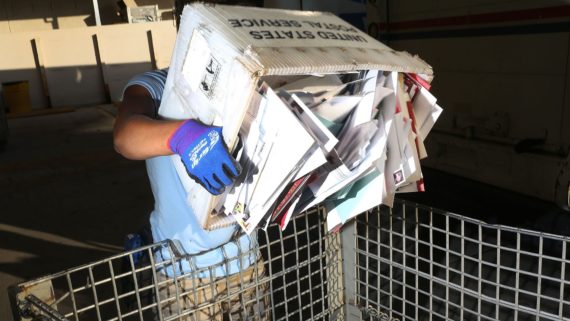
CNN Money is reporting that the latest financial reports show that the U.S. Postal Service is losing billions of dollars, but it’s not for the reasons that President Trump has
Losses more than doubled at the US Postal Service in the first three months of the year to $1.3 billion. But that’s not Amazon’s fault.
President Donald Trump has frequently complained that Amazon (AMZN) takes advantage of the post office, which has a contract to help deliver many of the online shopping giant’s packages. Last month he created a federal task force to look into the Postal Service’s finances.
The Postal Service is a government agency, but it operates as an independent business without direct taxpayer support. It has lost $65 billion over the last 11 fiscal years.
The agency said Friday that it has been hurt by the ongoing decline in traditional mail, coupled with increased costs for retiree benefits. Revenue from first class mail and junk mail, which the Postal Service refers to as “marketing mail,” fell by $181 million, or a 1.4%.
The Postal Service’s package business, by contrast, is the one segment experiencing strong and steady growth. Its sales grew by $445 million,
“I am right about Amazon costing the United States Post Office massive amounts of money for being their Delivery Boy. Amazon should pay these costs (plus) and not have them bourne by the American Taxpayer. Many billions of dollars. P.O. leaders don’t have a clue (or do they?)!” he tweeted last month.
Amazon has a confidential agreement with the Postal Service under which it delivers large numbers of packages directly to the post office nearest to where they need to be delivered. The Postal Service then delivers the packages the “last mile” to their destinations. The Postal Service says the law requires that such negotiated contracts cover its costs, and that regulators have studied the Amazon contract and approved it.
Amazon also has a special agreement with the Postal Service to deliver packages on Sundays in limited major markets. Neither Amazon nor the post office have disclosed the details of that agreement, but the Postal Service says it’s mutually beneficial.
As CNN Money reported back in April, President Trump has been making false claims regarding the relationship between Amazon and the Postal Service as part of his broader war against Jeff Bezos, who is far wealthier than Trump and frequently passed Bill Gates to be the wealthiest person in the world, who also owns The Washington Post:
President Trump stepped up his long-running battle with Amazon, ordering a federal task force to investigate the Postal Service’s finances.
The executive order issued late Thursday night does not mention Amazon by name, but Amazon is the subtext.Trump has frequently complained that Amazon (AMZN) takes advantage of the post office. Trump is angry at Amazon in part because its CEO, Jeff Bezos, is also the owner of The Washington Post, whose coverage Trump complaints about.
“It shall be the policy of my administration that the United States postal system operate under a sustainable business model to provide necessary mail services to citizens and businesses, and to compete fairly in commercial markets,” Trump wrote in the order.
In his previous tweets, Trump has insisted that the Postal Service is losing money on the package deliveries it handles for Amazon.
Amazon has a confidential agreement with the Postal Service under which it delivers large numbers of packages directly to the post office nearest to where they need to be delivered. The Postal Service then delivers the packages to their destinations.
This kind of confidential contract is not unusual for the Postal Service. Many large shippers negotiate them. They pay rates based on volume and what the post office has to do to make the deliveries.
The Postal Service says the law requires that such negotiated contracts must cover the Postal Service’s costs and that regulators have studied the Amazon contract and approved it.
Amazon also has a special agreement with the Postal Service to deliver packages on Sundays in limited major markets. Neither Amazon nor the post office has disclosed the details of that agreement, but the Postal Service says it’s mutually beneficial.
Some critics, including post office competitors such as UPS (UPS), have challenged the claims that the Postal Service’s negotiated deals with bulk shippers truly cover its costs, especially considering that the post office loses so much money.
Citigroup last year found that Postal Service prices would have to go up by $1.41 per package — about 40% — to reflect the true cost of delivery for all its customers. The Citigroup analysts estimate that would add $2.6 billion to Amazon’s shipping costs, an increase of 28%. Amazon has disputed those estimates.
The executive order noted that the post office’s problems are caused by many factors: steep declines in first class mail, laws that require the service to deal with large inflexible costs, and revenue that no longer covers pension and retiree health obligations.
“The USPS is on an unsustainable financial path and must be restructured to prevent a taxpayer-funded bailout,” Trump said in the order.
The Postal Service issued a statement Friday welcoming the task force.
“As we have repeatedly stressed, these business model problems are serious, but solvable, and the President’s executive order … provides an opportunity to further consider these important public policy issues,” the statement said.
Eli Rosenberg at The Washington Post focuses on the numbers:
[T]he Postal Service’s second-quarter results, which were released Friday, note that increases in shipping and package volume remained areas of strong revenue growth amid other declines and economic pressures, which added up to a $1.3 billion net loss in the quarter.
Though mail was down by 700 million pieces, or 2.1 percent, package volume grew by some 70 million pieces, about 5 percent, the report said.
fficials also cited declining letter volumes, and in particular the decline of the use of First Class and marketing mail, as a challenge faced by the business.
“Despite growth in our package business, our financial results reflect systemic trends in the marketplace and the effects of an inflexible, legislatively mandated business model that limits our ability to generate sufficient revenue and imposes costs upon us that we cannot afford,” Postmaster General Megan J. Brennan said in a statement. “With continued aggressive management and greater legal authority to respond to changes in our marketplace and to control our costs, the Postal Service can return to financial sustainability.”
The Postal Service has petitioned the Postal Regulatory Commission, the independent body that regulates it, to give it the ability to raise stamp prices beyond inflation, according to the Associated Press.
“Congress and the commission need to act now,” Brennan said.
I’ve written before about the Postal Service’s financial difficulties, and it’s clear that their problems are largely unrelated to the fact that they have a bulk delivery contract with Amazon. One of the primary factors, of course, is the aforementioned federal law that requires the Postal Service to pre-fund all of its retired employee obligations, including both pension and health care obligations, rather than operating under a pay-as-you-go system as most business entities do. This regulation is due, of course, to the lobbying power of the unions for postal workers who wanted to ensure that their employee’s benefits would be guaranteed notwithstanding the fact that the USPS was separating itself from the Federal Government. This has added billions of dollars per year to USPS obligations at a time when its revenues are being squeezed due to other factors.
The primary factor driving down revenue, of course, is the sharp drop in the use of first-class mail that has resulted from the rise of fax machines ranging from fax machines to email to the Internet, all of which have drastically cut down on the volume of mail that the USPS handles outside of packages and bulk mail such as so-called “junk” mail. In my case, for example, it’s hard to remember the last time I actually mailed something, whether it be a letter, a card, or, well, anything that requires using stamps or going to the Post Office. Like many people, I handle nearly all financial obligations online or via third-party services that make payments on my behalf. I haven’t subscribed to a paper magazine in years simply because I don’t have time to read them. And there are sometimes days that go by when I get almost no mail at all. The only things I get from my mail carrier otherwise are packages, from Amazon and other sources and from relatives or others, and even in that case, the traffic is slowly shifting to other services. Many of my most recent Amazon deliveries, for example, have come via either United Parcel Service or via a private courier service. This last has been especially true in the case of packages that are eligible for same-day or one-day delivery, which by the way is a really cool convenience if you haven’t taken advantage of it yet.
Back to Rosenberg for some of the facts on the Amazon deal:
Amazon uses the Postal Service for about 40 percent of its shipping needs, analysts have estimated, with a per-package cost of about $2, which is significantly lower than the rates charged by other major shippers, according to Post business writer Steve Pearlstein. Amazon shipped more than 1.2 billion packages in the United States last year, according to statistics cited by the Wall Street Journal.
The agency’s regulator has disputed the idea that Amazon is hurting its business. The Wall Street Journal reported that former postmaster general Patrick Donahoe told analysts last week that the contract with Amazon had been profitable for the Postal Service.
Pearlstein, who acknowledged the complex economic issues at play in the contract, wrote that the arrangement is likely a win for both Amazon and the Postal Service, which is getting additional business for something it is already set up to do: stop at every home, business, and rural post box six days a week, though it now provides the service on Sundays for Amazon.
“Looked at from the standpoint of incremental revenue (huge) minus these incremental expenses (modest), the Postal Service could very easily have come to the conclusion that, even at $2 a package, the Amazon contract was likely to be highly profitable,” Pearlstein wrote.
Ultimately, the complexities of the Postal Service’s modern financial picture is “a reality that is way too complicated for our president to understand,” he wrote.
There are several things that Congress could do to make things easier for the USPS to compete in this new environment. One would be to repeal the law requiring pre-funding of pension and health-care obligations, although that’s likely to face objections from union lobbyists. Another would be to provide more autonomy to the USPS to allow it to make ordinary business decisions without having to get Congressional approval. Several years ago, for example, Postal Service advisers stated that they could save billions per year by eliminating one day of first-class delivery, with most suggesting that the day that would be eliminated would be either Saturday, when many businesses that are expecting mail delivery are closed anyway, or Tuesday which, because of the weekends, is apparently typically the lowest volume delivery day of the year. In order to do this, though, they would need to get Congressional approval, and Congress responded to the idea by passing legislation that further limits the ability of USPS to make cost-cutting moves such as this. A final solution would be to lift many of the regulations that require the USPS to deliver first-class mail for the same rate anywhere in the United States regardless of the cost associated with the delivery. On some level, it is absurd that it costs me as much to deliver a letter to that would go to a location 30 minutes away from me as it would to send a letter to someplace thousands of miles away such as Alaska or Hawaii. No other delivery company does this, and the USPS is not required to do it for overnight mail or package delivery. Given the fact that first-class mail is a dying line of business anyway, if not already a dead one, this regulation is utterly silly.
Whatever changes are made, though, it seems clear that a solution needs to be found sooner rather than later. The Amazon contract and other bulk deliver contracts are one of the few areas where the Postal Service is actually making money, but that isn’t going to last forever. Amazon for one is already researching alternative methods of delivery, including developing its own delivery infrastructure, using drones, and even using couriers to deliver packages to your car wherever it may be parked. Once they’ve got that perfected, they may decide they don’t need the USPS for “last mile” delivery anymore, or that they need it for a much smaller volume of package delivery than they are using presently, and the size of the quarterly losses USPS suffers will be even higher. The future is coming, and either Congress can help the Postal Service get ready for it, or it can sit on its hands until the inevitable time for a Federal Government bailout comes. Guess which choice they’re likely to make?
H/T: Axios
Photo via Axios

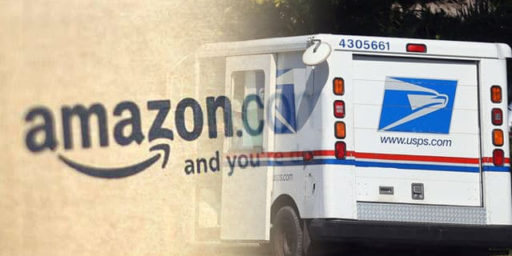
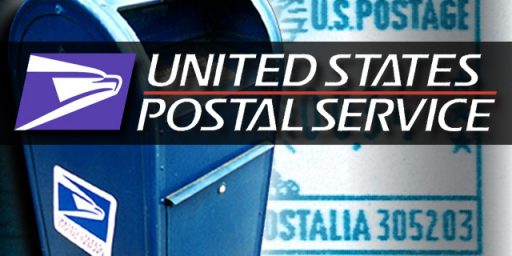

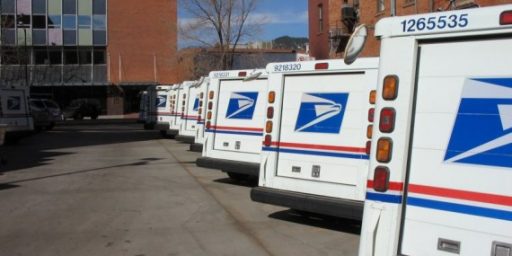
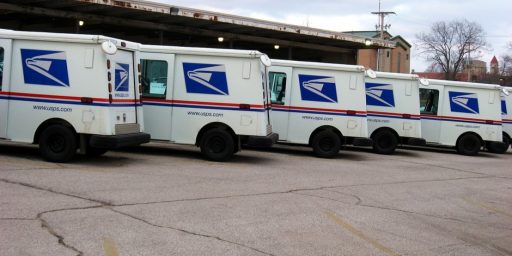
Cut off service to unpopulated red states like Wyoming, Idaho or Nebraska. Easy peasy. If you want mail delivery, move out of that rural bungalow with the MIA flag and the warning about how trigger-happy the property owner is, and get yourself to civilization. If you insist on living in Nebraska, fine, but your mail gets delivered to Omaha and that’s it.
It makes good business sense. It doesn’t harm the economy. So I’m sure that Congressweasels from empty red states will embrace the idea.
Another easy one, force all gated communities to use one large mail drop just like apartment complexes.
@michael reynolds: While I’m willing to subsidize rural areas to some degree, there’s a related issue that really ought be dealt with. I live in a highly populated area but in a suburban neighborhood that consists of a series of pipestems and cul-de-sacs. Those, like me, who live in a pipestem, get our mail delivered to a street-side mailbox adjacent to our driveways. Those who live in the cul-de-sac a few steps from me (I’m the last house in the pipestem) have to walk out the the “main” road, where there are several boxes lined up, and retrieve their mail. Meanwhile, my mother-in-law lives a few miles up the road in a different cul-de-sac in a much older neighborhood. She gets her mail hand-delivered by a walking postman right to her doorside mailbox.
I propose that everyone living in suburban areas have to get their mail from a constellation of boxes at the end of their road. That’s an incredibly minor inconvenience for us that would almost certainly save a major amount of time and money for the Postal Service. We could phase this in over, say, three to five years to give people time to erect the boxes.
@Mu: Ha. I was typing out a longer version of a similar thought while you were commenting. I don’t live in a gated community but agree with the larger concept. I’ve had to do that before and found it perfectly acceptable.
@James Joyner:
and
@Mu:
Last week there was a report that the USPS is moving in the direction James suggests:
More at the link.
I’ve lived in two communities that had these cluster boxes and they were really no big deal. I can see how they are a time and money saver for the USPS though.
Some years ago I drove to a small town in the rural area of the State of Minas Gerais, Brazil. Not a desolated place in the middle of the Amazon Rainforest. Less than 150 miles from the largest city in the Southern Hemisphere.
I thought, when I reach there I’ll find somewhere to have lunch. But I did not manage to find any restaurant, supermarket or the equivalent of a diner. The town was really small. But it did have a post office.
Having postal service in the suburbs and in rural areas, in large countries that have large where the population is sparse does not make sense from a market perspective. But it makes sense as a public service. and we are not talking about South Dakota or Alaska.
The free market would not provide large and cheap postal coverage to rural areas in Virginia or New York. Yes, that’s evil government in action, but, be it.
@James Joyner:
Differing incentives. A month or so back, I front loaded some Amazon purchases to help may mail carrier out as it was their annual piece count which determined how much he, a contract carrier, got paid.
True, but then it is the government that keeps sending out tax bills, demand notices, jury summons, etc. via First Class Mail. Not to mention the annoying campaign and constituent mailings by sitting politicians. Similarly with other legal notices.
I cross a busy highway to access my box across the road with nothing but a guardrail, embankment and cow pasture on that side because they only deliver to that side of the road. It’s an acquired skill to judge the 60 mph traffic so you don’t get caught on the guard rail inches from the the travel lane. I wouldn’t let any kid under 16 get the mail.
On the other hand, my sister lived in a community that required she have a box at the post office, that locked the doors at 4 pm. Had she not been a stay at home mom, they’d had to made sure the hit the post office for its couple hours open early Sat morning to get their mail. And this was 15 yrs ago when USPS was the go-to for bills, legal notices, etc.
So First Class Letter postage is now 50 cent. When are they going to issue a stamp with his mug on it?
Oh, just privatize it, pass a law saying Donald Trump has to buy it, and let the stable genius get stuck with the liabilities.
If you think the USPS runs at a loss, you should see the Department of Defense! Or Homeland Security. Or Energy. None of them bring in nearly as much in revenue as they spend.
…What’s that? You say this is somehow different? Please explain.
@JKB:
Yes, but parcels use the same infrastructure as First Class Mail. Even parcels in rural areas would be affected if you were going to use strict free market rules for them.
Several years ago I got a postcard from UPS telling me they had a package for me, but couldn’t find my address. (I live on a major surface street, but it is interrupted by a railroad, and apparently they had a vacation break driver.) I couldn’t get anyone at UPS to see the humor in expecting the USPS to find an address that was a mystery to UPS.
A lot of things that I order offer free, standard delivery. I wonder about that.
About 75% of our mail is advertising, most of which we never look at. When I go to the post office, I am amazed. There are three large barrels full of the advertising, magazines, coupons, and even the free samples. I often see people going through it for the coupons.
Saturday delivery? Forget it.
Our local post office has weird hours.
@michael reynolds:
The viable alternative is to eliminate postal service in urban and suburban areas. The reasoning:
– Urbanites have access to reliable high-speed internet which can replace most snail mail.
– Urbanites have scores of commercial choices to receive mail (mailboxes, etc. the UPS store, FEDEX store) that aren’t available in rural areas.
– Home delivery of packages is a viable business opportunity for urban areas – a private enterprise can fill this function and be successful thanks to population density and access to transport hubs.
– Urban areas don’t need package delivery as much because they have many more retail choices.
– Eliminating postal service will reduce congestion and pollution in urban areas.
Slightly off-topic, but it’s nice to see that the Orange Blob’s latest enemy is as scuzzy as the Blob himself is…
No, this is wrong.
The American Postal Workers Union (the union representing postal service employees) and the NALC (National Association of Letter Carriers) opposes the prefunding requirement and has called for it to be repealed.
The prefunding provision was included in the bill at the insistence of the Bush administration:
Blame politics, not the Union.
@michael reynolds: You mean to tell me that you think people should move to the city areas? Out here the opposite is occurring, with a big exodus from the urban areas to the sub-rural. Away from the rat race, traffic jams, high city taxes, crowds, and noise.
In many small town areas the post office remains a cultural institution. Here it is a gathering place, where people stop in, talk to friends, catch up on the latest local news, and find stimulating conversation: the high point of the day. It is an institution and important part of small town life. Up the road a post office is actually in a country store. People go in, get their mail, and sit around drinking coffee or Sun Drops and talk about everything. A reliable source of news and what is going on.